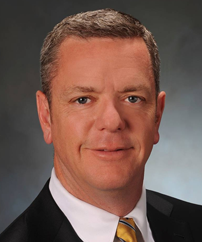It is obvious that the rise of well-funded brands like Uber, Lyft, and other transportation network companies (TNCs) dependent on online-enabled platforms to connect passengers with drivers is globally eroding the franchises of locally regulated taxis. Drawing on remarks recently made on the VerdeXchange 2015 Conference panel “How Technology and Competitive Drive Are Reinventing Mobility and the Urban Environment,” Bill Rouse, General Manager of Yellow Cab of Los Angeles, and Gabe Klein, a Special Venture Partner at Fontinalis Partners with experience leading public-sector DOTs, offered TPR their perspectives. Here, they address changes to the urban ground transportation system that unregulated competition is bringing to cities. Both comment on how cities can capitalize on new technologies while still maintaining options for passengers.

Gabe Klein
"The D.C. model for deregulation of the taxi industry—creating a co-op as a virtual layer of management that unifies the taxi industry—and putting every taxi in the city on one app creates an environment of healthy competition." —Gabe Klein
Bill, how is the dominant urban taxi industry being challenged by the rise of Lyft, Uber, and other technologies? Do taxis have a future in this new 21st-century ground transportation world?
 Bill Rouse: In order for taxis to survive, we’re going to have to see major changes on both the regulatory side and the business side. The challengers’ model, presented by the transportation network companies (TNCs), is almost wholly deregulated—in particular, in the critical areas of fleet size and pricing, as well as the ability to flex vehicles and drivers into their system at will. The taxicab regulatory model has very tight restrictions on those things.
Bill Rouse: In order for taxis to survive, we’re going to have to see major changes on both the regulatory side and the business side. The challengers’ model, presented by the transportation network companies (TNCs), is almost wholly deregulated—in particular, in the critical areas of fleet size and pricing, as well as the ability to flex vehicles and drivers into their system at will. The taxicab regulatory model has very tight restrictions on those things.
Cities and regulators have been struggling with what to do with taxicabs. Yellow Cab is trying to take an approach in the City of Long Beach, California that would provide a new roadmap and give cities a positive alternative to their historic regulation of the industry.
Gabe, from your perspective as a former transportation GM in Washington, D.C. and Chicago, what are these new ground transportation platforms about? How do they challenge the taxi industry that Bill represents?
Gabe Klein: The TNCs have exploited the overregulation of the taxi industry—which has actually brought about sub-par service in lots of cities. Sure, the smartphone is important. But really what they’ve done is reduce the friction for customers to utilize this type of service.
The sad thing is that the taxi industry is much bigger and has the capability of doing all the same things, and more. But they’re fractured. Many of the companies, particularly smaller ones, are living in the mid-20th-century and don’t even want to have credit cards. Things are moving way, way beyond that.
There’s never going to be one player that runs everything in ground transportation. We need a competitive industry, which means probably more regulation on TNCs and less regulation on taxis. We need to create a fair playing field to assure ourselves and future generations that we have a robust ground transportation system with many layers of options. That’s the important thing—to maintain lots of options for people.
Personally, I’m also interested in what’s going to happen when the autonomous cars come.
Bill, how is TNC competition affecting operations of the taxi industry—in which you’ve been a national and international leader? What business and regulatory model will allow the industry to evolve and prosper, providing a user-friendly, profitable urban ground transportation system?
Bill Rouse: The taxi industry is in the middle of a very long learning process about how to deal with the advent of these new services and has been focused for three to four years on fighting them, on very legitimate grounds: that they are illegal and unsafe.
But as the policymakers have spoken in jurisdiction after jurisdiction, the taxi industry is coming to realize that these (TNC) services are here to stay and that the playing field is very, very un-level right now. We need to focus on leveling the playing field in ways that Gabe talked about, but also in figuring out how we’re going to compete directly with TNCs on everything from price and service to scale and the like. That has not been an easy lesson for the cab industry to digest.
There are many people with their life savings at stake. I’m not talking about cab moguls, like you hear from our opponents. I’m talking about real, working-class people.
There’s a lot of anxiety in the industry, but there definitely needs to be some leadership to get them over to the other side—to a world where they can compete, and compete successfully.
Gabe, while you are now exploring private sector entrepreneurial opportunities in urban mobility, you were for almost a decade a transportation official inside the city administrations of both D.C. and Chicago. Give us your perspective on how cities are grappling with online-enabled technologies that connect passengers with unregulated drivers using their personal, non-commercial vehicles?
Gabe Klein: Often you’ve got a mayor who sees the shiny new object or great new service and wants to be competitive with other cities. They want to maintain the millennial flow into their cities. A lot of mayors are very supportive of services like the TNCs.
As transportation director in D.C. and then commissioner in Chicago, I wanted to allow these services, particularly when they were small. I thought, “Let’s see what they do before we pre-judge them.”
But now elected officials, down to the bureaucrats in the agencies, are saying: “Wait a second. We were cool with offering this as a service, but we want people to be able to pay cash and we want vehicles that serve the entire city. We don’t want to lose our licensed, insured, regulated taxi industry.”
There’s a rush now to figure out how to deal with this. As Bill was saying, you can’t continue to raise the level of regulation on the taxi industry while allowing a completely deregulated industry to operate, and expect it to end well.
Washington D.C. is leading the way—as it has on things like bike share, circulator buses, and streetcars. The D.C. model for deregulation of the taxi industry—creating a co-op as a virtual layer of management that unifies the taxi industry—and putting every taxi in the city on one app creates an environment of healthy competition. It’s allowing the taxi industry to step up its game. At this point, most of the taxi companies want to step up their game if the government would let them.
Bill, could you add to Gabe’s comments?
Bill Rouse: To be honest, I’d like to believe that most cab companies are ready to go—but I’m not sure I could say that for all of them.
I do believe that we’re in a process of evolution here. The cab industry, by and large, can see that major changes need to happen. I don’t know if a roadmap to the big picture solution is yet clear to most cab operators. That’s what we’re trying to experiment with in Long Beach.
I think Gabe is right.
Gabe, what explains the newspaper headlines in the recent months reporting sizable investment dollars being invested in TNCs? What are investors imagining as the returns and the prospects of these investments?
Gabe Klein: For one, they’re seeing the rise of the sharing economy, where asset-light models are becoming very popular. You’re leveraging assets that aren’t being utilized heavily. Extra rooms in people’s houses and cars that sit 94.8 percent of the time are obviously large capital expenditures, and what I tend to call “lazy assets.” I think that the ability to leverage large revenue streams with very little overhead is very lucrative. Now, they’re counting on the fact that there’s not going to be any regulation.
New York is a good example where the taxi industry is doing very well, while Uber and Lyft have really not made inroads.
You’re seeing money flow in, but you’re also seeing people like SoftBank buying taxis in Asia. It’s different by continent.
But as long as you can generate large sums with very little asset or operational responsibilities, it’s a pretty tempting investment.
Bill, if you, Gabe, and the others who were part of that VerdeXchange 2015 Conference panel on this subject come back again to VX2016, what do you believe the ground transportation landscape will be like? How different will it be?
Bill Rouse: The short answer is that I haven’t the foggiest idea.
I’m counting on our industry to make significant strides toward modernization over the next year. I don’t believe that there’s a lot of time for us to move on this.
I’m also counting on regulators everywhere waking up to the fact that there are certain aspects of our regulatory structure that benefit the public, which regulators can’t see removing from us. If they’re going to talk about leveling the playing field, these regulations need to be applied to the other side.
One of those things is certifying drivers with real, genuine, fingerprint-based criminal background checks. I can’t see a world where regulators say, “We’re going to relax that requirement on the cab industry,” so they’re going to have to start increasing the regulation on the other side.
At the same time, they’re going to start having to give cab companies the flexibility to experiment and allow us to compete.
I personally pleaded with regulators to get moving on this, but so far there’s been very little movement. Hopefully by next year we’ll see huge strides.
Gabe Klein: Things are changing so fast. There’s going to be a tremendous amount to talk about.
I’m hoping actually to have a book out by next winter. We’ll see if I can get my act together and write enough. It’ll be on how cities and the private sector can partner to make real change, stop fighting each other, and collaborate more.
It’s a really exciting time in transportation, if we set the right policy and we work together. Or it could be a not-so-great time, like in the 1950s when we lost the streetcars and gave all the space over to cars. Hopefully that doesn’t happen.
I think we’ll be talking a lot more about autonomous technology this time next year, and probably getting ready for some of the rollout in 2017. That’s going to change the taxi industry and the TNCs dramatically.
Lastly, Gabe, regarding your D.C. experiment—what will you likely report?
Gabe Klein: I hope that it’s very successful and puts taxis in a position to shine.
I’d like to say that by next year taxis will be growing their business versus contracting. If you look at the origin and destination data from Uber, they’re picking people up in very different places than taxis are. TNCs have grown the market, so I think there’s a big opportunity for taxis to then come back and start taking some of that market. It’s very reasonable to see a net increase in taxi business in 2016.
- Log in to post comments



